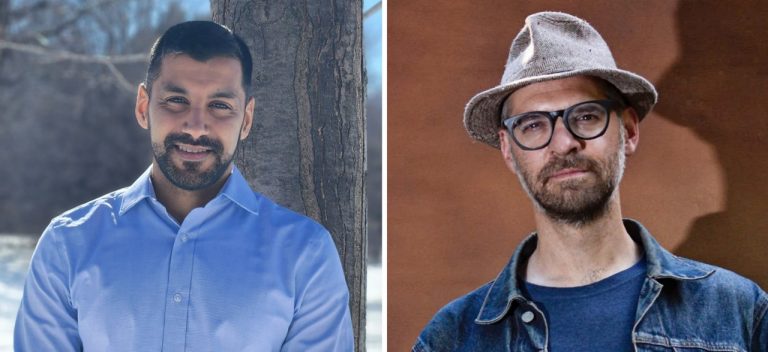2 Concordians will compete in the last round of the 2024 SSHRC Storytellers Challenge

Concordians Sunjay Mathuria and Guillaume Jabbour are finalists in this year’s Social Sciences and Humanities Research Council (SSHRC) Storytellers Challenge.
The annual contest calls for postsecondary students nationwide to demonstrate — in a three-minute or 300-word presentation — how SSHRC-funded research impacts Canadian society.
Jabbour, a master’s student in the Department of Communication Studies, and Mathuria, a PhD candidate in the Department of Geography, Planning and Environment, are among the 20 finalists that won $3,000.
They will have the chance to present before a live audience and distinguished jury to be named one of the five winners, which carries an additional $1,000 prize. This year, the Storytellers Showcase will be held in May at the Science Writers and Communicators of Canada conference in Saskatoon, Saskatchewan.
‘Arts-based research offers new ways of thinking about old problems’
Jabbour, who is part of Concordia’s Centre for Oral History and Digital Storytelling and the Aging + Communication + Technologies (ACT) Lab, is exploring how “soundwalking” can build intergenerational bridges and community.
Soundwalking is a research-creation methodology that invites participants to engage in mindful listening and consider their place within the surrounding soundscape. This practice also prompts participants to contemplate the significance of the site where the walk takes place.
In his audio submission, Jabbour tells us about his research-creation project involving community members in a rural region in Quebec’s Lower Laurentians. Teenagers and older adults participated in deep listening activities by the historic Avoca Bridge. Jabbour shares how this soundwalking experience helped contribute to a sense of community among project participants.
“There is so much innovative work going on in social studies and humanities research,” says Jabbour. “Arts-based research, in particular, offers new ways of thinking about old problems and I think it is important for people to find hope in this idea.”
‘Storytelling is foundational to how we effectively communicate our research’
As part of his PhD, Mathuria is researching narratives of memory in cities that have experienced spatial trauma. In his 300-word submission, Mathuria tells the story of how he unexpectedly found the door of the home of his ancestors in Lahore, Pakistan, three generations after their departure.
In 1947, his family had to flee their home after British India was partitioned into two independent states, Pakistan and India. This led to mass displacement, upheaval and violence, especially in the Punjab and Bengal regions.
His submission is a personal exploration of Mathuria’s connection to Lahore as a researcher, delving into the unexpected ways the concept of "home" intertwines with research that crosses personal and familial boundaries.
“Storytelling is foundational to how we effectively communicate our research ideas and make connections with people,” Mathuria says.
“I also think many racialized researchers in the social sciences and humanities can find themselves personally entangled in research in complicated ways. Being able to navigate and articulate those feelings through stories can help us — and others — understand our work in different ways.”
Find out more about the Social Sciences and Humanities Research Council (SSHRC) Storytellers Challenge as well as Concordia’s School of Graduate Studies.




